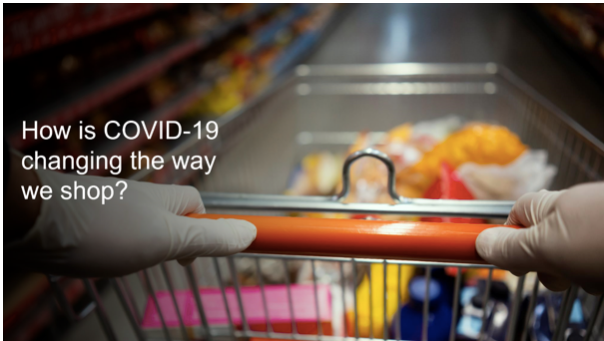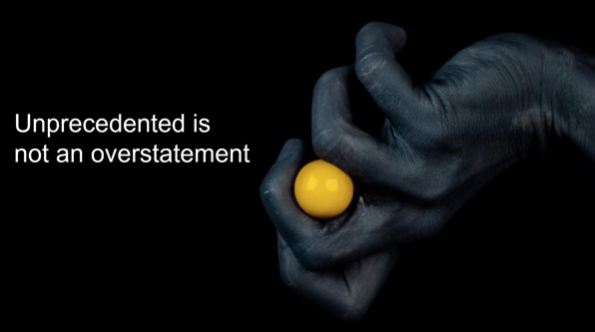Keeping Up With Egyptian Consumers During COVID-19
By Nermeen Bedeir, Chief Client Officer North Africa, Insights Division, Kantar
While grappling with the implications of COVID-19, remember that pragmatism as the new purpose, serving as an effective lens through which to focus on the future and what it might bring for consumers and marketing professionals alike.

Looking specifically at global and local COVID-19 attitudes on understanding the general level of concern and what drives this right now, we turn to Kantar’s global C19 Barometer findings, a study that looks into how the pandemic has already influenced behaviours, attitudes and expectations across more than 50 countries and 45,000 consumers.
The level of concern in Egypt is moderate compared to elsewhere and in fact declining, according to findings from the latest wave of the Barometer study. This is largely due to the fact that we’ve only faced semi-lockdown restrictions. In fact, the Minister of Health reports that Google Maps shows the density of people on our streets has doubled since Ramadan.
That said, 70% of Egyptians state COVID-19 has highly impacted their daily lives. Social media listening tools show that the larger APAC region is largely worried about the health of loved ones and impact on the economy, putting others ahead of themselves for greater good. But in Egypt, despite the stated panic from the rising infection and mortality rates, we are first and foremost concerned about financial stability and job security.

Drilling down into household shopping behaviour, Kantar’s Worldpanel shows FMCG spend is evolving. Specific sectors driving this growth globally include hygiene and cleanliness, home and personal care categories like bleach, household cleaners and personal wash, with beverage categories least impacted. Here in Egypt, categories like feminine protection, white cheese, ghee, personal wash and chocolates saw increase in basket size due to stocking up behaviour.
That said, the world is facing an unprecedented recession as a result of the Great Lockdown, and there’s uncertainty over when we will come out of it. We can expect that recession will force additional trading down, postponement and shifting in demand, such as categories and brands battling for share of a diminished wallet.
This means that brands that invest for the future will gain competitive advantage and recover faster, as a review of brands during the Great Recession shows brands that made significant share gains did so because they implemented an effective growth strategy and anticipated the future, rather than just reacting to current circumstance.
Planning With Pragmatism For brand Growth Beyond Survival
If sales of a category decline, some will survive better than others, based on structural or brand positioning advantages but generally all brands will suffer similarly. So what can your brand do now to perform better than its competition? Big brands will tend to perform better than small ones because they are more easily available if people want to buy them. For example, Kantar Worldpanel found in the UK 71% of brand leaders gained share during March 2020, with brand leaders like Domestos bleach and Andrex toilet paper gaining share.
So there’s an opportunity for brands to grow in lockdown, but it‘s difficult to pinpoint as people’s attitudes and behaviour are likely to diverge more than normal, especially when supply is constrained.
Therefore when recession hits, we can expect further changes in behaviour that will result in brands fighting for share of a smaller consumer wallet. So it’s mission critical to ensure people who desire your brand can easily buy it. There are widespread reports of shortages of flour and yeast as people resort to home baking and post their successes on Instagram, but will the satisfaction of producing something edible from your own kitchen compete with convenience of a store-bought loaf?

Part of the challenge for brands in any category is to anticipate what structural changes like this will mean for their category. For instance, less commuting and working from offices would likely mean less fast food is consumed and less need for new cars and smart clothes. On the upside, apart from the obvious winners like Netflix, WhatsApp and Zoom, perhaps people will order new kitchen appliances and utensils?
It is all too easy to regard a recession as a threat but not every category will suffer. Even when they do, individual brands can find competitive advantage and position themselves well for the recovery. One of the challenges is to balance authenticity with opportunism, so don’t jeopardise the longer-term future of your brand with short-term actions such as discounting a premium brand too much to hold sales volume. Brands success is relative, so those brands that focus on operational efficiency and invest for the future are likely to perform better when recovery arrives.
The real winners will be the ones that anticipate long-term changes in consumer behaviour and attitudes due to the recession and position themselves accordingly.
How Egyptian Consumers Are Adapting To Life Under Semi-Lockdown
There are seven main impacts to note on how Egyptian consumers’ attitudes and behaviours are evolving as a result of these unprecedented times of Ramadan during the Coronavirus pandemic:
Impact 1: Strengthened nuclear family relationships by bonding and spending more time together on bicycle rides, boardgames, cooking and family movie nights
Impact 2: Bringing the outside in by Ramadan’s vibes and added self-sufficiency
Impact 3: Back to basics, with appreciation of the simpler aspects of life taken for granted or forgotten before COVID-19
Impact 4: Self-reflection, forgotten passions and increased spirituality, serve as a wake-up call to re-evaluate priorities.
Impact 5: Suddenly homemade is king with recipes, cooking tips and culinary accomplishments filling newsfeeds.
Impact 6: Digital has become our window to the outside world, with TikTok, Zoom, Messenger and House Party seeing an upswing.
Impact 7: Overstocking purchases as a safeguard of loved products, driven by fear of tomorrow.
Starbuck’s was quick to offer free coffee for healthcare practitioners, but other brands have since reacted to include the likes of Coca-Cola’s free home-delivery service, where branded delivery trucks visiting gated compounds; Dara’s ice-cream offering a pick-up and home-delivery offering, completely new to this category; as well as Inertia’s retail sector innovation through online unit selection and contract home delivery.
People are looking forward to going back to normal, but as we’re all unsure of what the new normal will look like, it’s time for brands to step up and show they understand what consumers now want and need.
Four key take-aways for brands to stay relevant and cater to consumers’ evolving needs
- Create collective meaning to bring people together in a crisis, as meaningful action today will help accelerate your recovery tomorrow.
- Amplify shared values by activating your brand purpose. Authentically engender feelings of community and optimism, stay empathetic and true to your essential brand values.
- Ensure communication fits the moment. This means the need to reframe relevance and amplify messages that celebrate societal good.
- Pivot from reactive to proactive, by anticipating the changing human story and cultural narrative to ensure you survive today and thrive tomorrow.
Pivoting your brand offering to meet changing human needs is the new brand normal.

How To Communicate Effectively During COVID-19
Advertising during COVID-19 times is a burning topic, with the most pressing question whether to stop advertising currently or not.
The global COVID-19 Barometer shows that 94% of consumers believe brands should continue advertising, as consumers feel life and the economy need to go on. Some see advertising as a welcome distraction or a pleasant reminder of more normal times, as we need a sense of diversion from all the COVID-19 news and still need to buy things, so a touch of normalcy should be preserved.
This leads to the second most pressing question of our times: Whether certain categories shouldn’t be advertising right now. This answer is a resounding yes, especially when it comes to government-restricted categories like out-of-home entertainment, travel and categories that are in short supply.
Advertisers need to maintain a proper and valid mix to win as ensuring relevance, so focusing on what matters and providing useful information are key but be cautious as 75% of consumers agree that advertisers should not exploit the situation to promote their brand.
In summary, strong brands can survive this, but do so, they need to make the right decisions right now. This means staying closer to your consumers than ever before, as understanding how they’re changing and which of those changes will likely persist beyond the crisis is key to making the right calls.
Some things may be changed forever, while others will revert to the way they were. Spotting the opportunities while not getting distracted by transitional needs will be critical.





